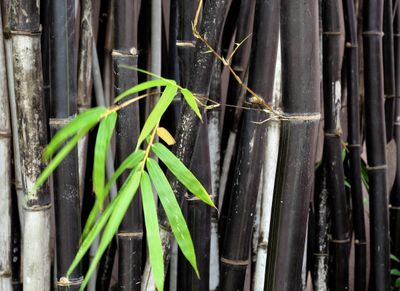Is Black Bamboo Invasive?
There are several varieties of bamboo with black culms (stems) and over 1,200 species of bamboo in general. Phyllostachys nigra, or ‘black bamboo,’ has the potential to be very invasive. This Chinese native is classified as a running bamboo, meaning it spreads quickly by underground rhizomes. However, do not let that discourage you from planting it. With some black bamboo information in hand, you will know how to minimize its invasiveness.
How to Care for Black Bamboo Plants
Running bamboo types, such as black bamboo plants, are ideal for creating a dense hedge or privacy screen. Your plants should be placed 3 to 5 feet (1-1.5 m.) apart for this purpose. However, you will probably only want to consider growing black bamboo if you have a very sizable area for it spread out. There are many strategies you could employ to contain the size of a bamboo grove, such as root pruning or even a root barrier. If you’re opting for a root barrier, install the barrier at least 36 inches (91 cm.) deep between the bamboo grove and the rest of your property using materials in the trench that are impenetrable, such as rolls of fiberglass or 60 mil polypropylene. The barrier itself should protrude 2 inches (5 cm.) above the ground to discourage any wayward rhizomes. If all of this seems too daunting or if you have minimal garden space, then remember this black bamboo information: black bamboo, like other types, can also be enjoyed as a container plant. Black bamboo plants are considered highly ornamental for their culms, which transition from green to ebony black by the third year of growth. Therefore, some patience is required to witness this bamboo in its full black splendor. Black bamboo is also regarded as being the hardiest of all the bamboo species with a USDA zone rating of 7 to 11. In terms of size, black bamboo is capable of reaching heights of 30 feet (9 m.) with the girth of its culms being at least 2 inches (5 cm.). The leaves of black bamboo are evergreen, bright green, and lanceolate in shape. Black bamboo can grow under varying light conditions, from full sun to partial shade. New bamboo plantings should be watered regularly until they are established. The addition of mulch around the base of bamboo plants should also be considered to retain moisture. Black bamboo prefers soil that is characteristically moist and loamy with a soil pH ranging from highly acidic to slightly alkaline. Fertilizing is not mandatory for growing black bamboo, but you can opt to do so in mid to late spring with a fertilizer high in nitrogen.
